- Home
- Charles L. Grant
Chariot - [Millennium Quartet 03]
Chariot - [Millennium Quartet 03] Read online
* * * *
Chariot
[Millennium Quartet 03]
By Charles Grant
Scanned & Proofed By MadMaxAU
* * * *
* * * *
Part 1
Dreamed Last Night...
* * * *
1
1
T
he dragon lay in the middle of the desert. Sleeping. Always sleeping. A mirage, for those who believed in ghosts; a metaphor, for those who believed only in seeing. And what they saw, ghosts or not, were eyes and scales that glowed in Joseph’s glorious colors as soon as the sun went down, bright enough to drive the stars back behind the mountains that formed the broad and long desert valley, almost bright enough to kill the moon.
Blinding without pain.
The dragon didn’t care.
It never stirred; it only breathed.
And every sunrise it vanished, only the heat of its fire left behind, colors fading to bland.
The man who stood on the small porch of his small home knew it was a fanciful, even a gaudy notion— dragons and ghosts and scales and breathing fire—but it helped explain the way the city, smack dab in the middle of what used to be nowhere, had taken over the desert when the desert wasn’t looking. He didn’t much care for the dragon. He didn’t much care for the desert, either, but there were times when he had no choice but to visit both.
He grunted a humorless laugh.
Visit?
Not likely.
Nobody really visits Las Vegas. It’s a place people use as an excuse to die.
He grunted again, not liking his mood. It was dangerous, feeling like this, but he couldn’t help it. Couldn’t stop it. Couldn’t figure it out.
He stretched, yawned loudly, and scratched the back of his neck vigorously. A glance at the white wood lawn chair beside the door, and he decided to stand. A day like today, it would be too easy just to have a seat and doze the evening away.
He was a medium-size man who managed to look taller through no effort of his own. Hair that brushed over his ears, thick and richly auburn, a smattering of silver he’d stopped bothering to hide. Eyes that squinted more often than not, even in the dark. A slight hook to his nose. Hands that looked rough and arms that looked thick; more than once he’d been mistaken for a laborer of some kind, especially since he seldom wore suits, and hardly ever a tie. He never visited a gym, or a spa, or had equipment at home, but a strong man nonetheless, naturally so.
The usual uniform tonight: a pair of polished brown boots, clean black jeans, an untucked white shirt that hung over his belt, not quite loose enough to hide completely the slow birth of a paunch. Sleeves rolled up one fold shy of his elbows. A pack of cigarettes in the breast pocket.
He stretched again, yawned again, and rubbed the side of his nose, hard, squinting against the glare of the fast-setting sun off the windows of the house across and up the street.
Y’know, he thought, left hand slipping under the shirt so the thumb could hook under the belt; y’know, maybe you ought to skip it tonight, y’know? Maybe you should just let the damn critter alone just this once.
A nice idea, very tempting; unfortunately, not an option.
The refrigerator needed filling, the rent needed paying, and he couldn’t shake the feeling that his wallet needed, desperately needed, feeding.
That made him uneasy, because he didn’t know why.
He knew it wasn’t the news; he’d stopped watching that a long time ago. The explosive violence that had ignited across the country had calmed; the famine that had created lines for bread and eggs and simple pleasures like ice cream had been relieved when last year’s spring rains had mercifully returned and farmers once again took to their plows, herds were replenished, and slowly, very slowly, the lines began to disappear.
That was the good news.
The bad news was the young woman, name unknown to him, who had staggered out of Notre Dame cathedral seven months ago, in Paris, in October, and collapsed on the steps. Fever burned her, eruptions pocked her, and no one wanted to admit that what had once been believed eliminated had returned.
With a vengeance.
The young woman had been the first.
She was far from the last.
He had no idea how many had the Sickness now, only knew that the fear he felt whenever he heard the latest rumors, whenever he inadvertently saw a headline out of the corner of his eye, wasn’t entirely due to the horrors of the dead and the dying.
There was something else, and it gave him occasional nightmares, all bleeding colors and no substance.
A sudden gust of hot wind made him turn his head away from the grit and sand that hissed past him. He spat automatically, though none had gotten into his mouth, and wiped his lips with the back of a hand.
“Shouldn’t spit, Trey,” a little girl’s voice scolded playfully. “Momma says that’s impolite and rude and unsanitary.”
The child who belonged to the voice stood in the un-paved street. A T-shirt, beat-up jeans, and thick-soled sandals. Long hair parted in the middle and hanging over her shoulders in braids. A pug nose he wanted to kiss each time he saw it. A dimple in her chin, just like her mother.
“Evening, Moonbow,” he said, leaning a shoulder against the porch post, folding his arms across his chest. “Do you even know what unsanitary means?”
She nodded solemnly. “Sure. It means you can’t eat the food you drop on the floor or you’ll get icky germs.”
He frowned. “That’s funny. I do it all the time, and I don’t get sick.”
Her eyes widened. “Really? Will you call me the next time? I want to watch.”
He laughed without a sound, pushed away from the post and stepped lightly off the porch. He inhaled slowly, filling his lungs, exhaled slowly with a long and exaggerated sigh of contentment.
“I think,” he announced, “I am going to build a castle.”
Moonbow giggled, and he shrugged.
Why not? It wasn’t like anyone would notice, except maybe a couple of bored lizards and a buzzard or two.
He and those left of his neighbors lived as deep into the desert as they possibly could while still taking advantage of the city’s services. A development that had gone so far as to lay out streets, mark acre-size plots with little stakes flying little red flags, lay in water and electricity, and erect a billboard that told the public they couldn’t possibly do better than to live in Emerald City.
It was supposed to have been a showcase.
Expensive houses all over the place. Low-slung, sprawling affairs with, according to the artist’s renditions in the slick brochures he had seen, walls and gardens and fountains and for God’s sake trees that hadn’t been seen west of the Mississippi in a good eon or two.
When the development company went bust some nine years ago and the city took over, the plots became magnets for those who wanted so desperately to live in the desert by the dragon that they didn’t much care about what the city eventually built to recoup some of its losses—small four-room-with-bath stucco-façade houses with fake California-tile roofs, casement windows, and central air-conditioning units that growled like lost bears. One to an acre”, most of the land in back. The rooms were small, function over comfort. When someone threw a party—a birthday, an anniversary, a thank God I’m moving out—everyone always ended up outside just so they could breathe.
No landscaping at all.
The yards, front and back, were sharp-bladed tufts of desert grass, sandy soil, a cactus here and there, and here and there a garden that usually required more tending than a sick baby. A shrub or two. Joshua trees.
And almost everything died by the middle of Ju
ly.
Thanks to Moonbow’s suggestion one night late last summer, he now had an invisible hedge that bordered the street. Together they trimmed it with equally invisible tools, made sure no one walked through it and damaged the branches, and had been thinking about turning some of it into a topiary after she’d seen one in a gardening book.
“You know, kid,” he’d said one afternoon in November, “sometimes you’re as loony as your mother.”
She didn’t speak to him for five days.
The dragon beat him senseless every night until she forgave him.
What she didn’t understand, what he thought he truly understood, was that you really did have to be loony to live out here. Only one long street, no streetlights, no curbs, no paving, no sidewalks, no nothing.
Over the years, the place had picked up a reputation, and now the only ones who would live here were people like him. And Moonbow’s mother.
Still, the city didn’t seem to mind; it collected its due and left them pretty much alone, except for the occasional visit by a town or state official who wandered around the area, wondering what in hell had happened out here. The cops didn’t care; they patrolled once in a great while, mainly just to see if anyone was still dumb enough to stick around. There was seldom any trouble. Nobody killed anybody; nobody robbed anybody else. And those who came out to do just that were actively discouraged from ever coming back.
The wind blew again, and he looked up at the sky running blood behind the sun almost gone.
He shook his head.
Stay home, the wind told him; do yourself a favor and stay the hell home.
And what if I don’t?
No problem; you’re going to die.
Quickly he turned back to the house, for no reason at all thinking he’d seen hunting cabins bigger than this, for crying out loud, and reached for the post with his left hand. He patted its rough sides, ran a palm along them slowly, and stepped back.
Nope.
He wouldn’t die tonight. The house was still waiting.
“Trey?”
Yet the apprehension wouldn’t leave. He checked the sky again, just to be sure there wasn’t a storm on the way, and blinked when he finally figured out what was wrong—or part of it, anyway:
It wasn’t the news; it wasn’t the nightmares. It was, for the time being, more important than that—he had passed a milestone without realizing it.
“Two years,” he whispered in quiet amazement. “Son of a bitch. Two years two months, this month.”
“Cursing is bad for you,” Moonbow scolded, coming up behind him.
“Germs?” he asked, not turning around.
“No. It makes you all ugly and disgusting inside. Like an icky gnome.”
He hunched over, hooked his fingers into claws, twisted one side of his mouth, bulged his right eye, and whirled to face her. “Like this, little mistress?”
She studied him carefully. “I don’t think so. I don’t think you can drool inside.”
He stared as she took a tissue from her hip pocket and gently pat-dried the side of his mouth. “Thank you.”
“You’re welcome.”
They shook hands and moved to the gap in the invisible hedge. Stood side by side. Waiting for the sun to die behind them.
His house was the first on the right, the first in the development, and the only one with no blocking structure across the street. This allowed him to mark when the dragon’s scales began to glow, a man-made borealis that put the rest of the city’s lights to shame.
“How old are you, Moonbow?” Spoken softly, in the twilight.
“Ten. Next Thursday.” She sounded disappointed he hadn’t remembered.
He nodded. “So what special present would you like?”
“Momma says it isn’t right I should ask for anything. She said that would be . . .” She concentrated before saying, “. . . materialistic.”
“I see.”
“That means—”
“I know what it means, Moonbow. And no offense, but your mother’s a loon.” He stiffened, scolding himself for speaking without thinking.
“I know,” the child answered, a little sadly, but grinning nonetheless.
“Good. Then I’ll get you something anyway.”
“A necklace,” she suggested immediately, enthusiastically. “I’d like to have a necklace.” Without looking up, she took his hand.
“Okay.” He made a show of concentrating. “I think I can manage that. Emeralds or diamonds?”
“Pearls.”
“Man. Didn’t waste any time, did you?”
“I like pearls. They’re pretty. Starshine says diamonds are tacky, though.”
She would, he thought. Sister Starshine, two years older by the calendar, much older than that otherwise. At least she liked to pretend she was. Sometimes it worked. Trey thought she was spooky.
He glanced up the street. “Where is she?”
Moonbow shrugged. “Home, I guess. Momma won’t let her out until she does her homework. I already did mine. It was easy. Starshine hates school; you know. She thinks it’s a waste of time. She says everybody’s going to be dead soon, so there isn’t any point.”
“Not true, kid.”
“But—”
He squeezed her hand briefly. “So when was the last time we had a case here, huh?”
Moonbow frowned. “I don’t know. Never?”
“Never, that’s right. Not one. Ever. Las Vegas is as pure as the driven snow. Not even a pimple.”
She giggled. “Starshine has pimples. One right on the top of her nose. She steals Momma’s makeup to hide it.”
“And you don’t get them, right?”
“Nope. That’s ‘cause I wash my face every day. That’s ‘cause I stay clean.”
“Good for you.”
Twilight deepened.
A stereo up the block showered the street with soft violins.
“Trey?”
“Hmmm?”
“Are you going to be here? For my birthday, I mean?”
“I guess I am,” he answered, sounding surprised. “You know, I guess I am.”
Two years; two years and change without leaving.
Without—
“Good. I don’t like it when you’re not here.”
He wasn’t at all sure he felt the same, Yet, when he wasn’t here . . .
He shuddered.
Not tonight; you are here, and that’s what matters.
Up the street a light clicked on at the corner of someone’s porch roof. Seconds later, another light, hooded and carefully aimed at the street so those who walked at night wouldn’t be blinded. Every night, rotating equally among all the renters except him, they replaced the absent streetlamps.
Moonbow tugged his hand. “You gonna fight the dragon tonight?”
He nodded.
She whispered, “You’re supposed to have a princess, you know.”
“I have one,” he answered, and squeezed her hand again.
A long minute, standing in the twilight, until she said, “Thank you.”
And he said, “You’re welcome.”
* * * *
2
His real name was Wallace Thackery Falkirk, and he hated it, never used it, and was, in retrospect, grateful his mother had been a card player and had nicknamed him Trey, because he was the third child, and the three was her favorite, lucky card. It didn’t matter what the suit was; it was the number that counted.
It must have been lucky.
His brother had died shortly after birth; his sister was murdered by an addict in Chicago, breaking into her apartment, looking for something to steal, finding her in bed, and strangling her with the telephone cord while she called the police.
Biology demanded he have a father, but he never knew him, didn’t miss him, and once he’d gotten into college, never once felt compelled to find him.
For the longest time after graduation, however, he couldn’t shake the belief that he was too much like him.
Not much good for anything but taking up space.
An English major and a music minor did not, in the general scheme of things, lend themselves to positions of authority and lucrative salaries. The plan to get his Masters in one or the other so he could teach was sidetracked when his mother keeled over during an after-hours poker game in San Diego, dead before her face hit the table. It would have been poetic had she held aces and eights, but she’d been bluffing and her hand had been worthless.

![[Oxrun Station] The Orchard Read online](http://i1.bookreadfree.com/i/03/17/oxrun_station_the_orchard_preview.jpg) [Oxrun Station] The Orchard
[Oxrun Station] The Orchard![Riders in the Sky - [Millennium Quartet 04] Read online](http://i1.bookreadfree.com/i/03/20/riders_in_the_sky_-_millennium_quartet_04_preview.jpg) Riders in the Sky - [Millennium Quartet 04]
Riders in the Sky - [Millennium Quartet 04]![Chariot - [Millennium Quartet 03] Read online](http://i1.bookreadfree.com/i/03/19/chariot_-_millennium_quartet_03_preview.jpg) Chariot - [Millennium Quartet 03]
Chariot - [Millennium Quartet 03]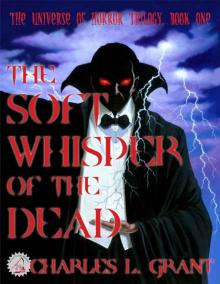 The Universe of Horror Volume 1: The Soft Whisper of the Dead (Neccon Classic Horror)
The Universe of Horror Volume 1: The Soft Whisper of the Dead (Neccon Classic Horror)![[Oxrun Station] Dialing The Wind Read online](http://i1.bookreadfree.com/i/03/19/oxrun_station_dialing_the_wind_preview.jpg) [Oxrun Station] Dialing The Wind
[Oxrun Station] Dialing The Wind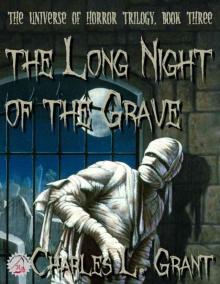 The Universe of Horror Volume 3: The Long Night of the Grave (Neccon Classic Horror)
The Universe of Horror Volume 3: The Long Night of the Grave (Neccon Classic Horror)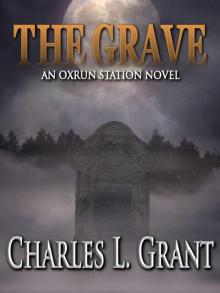 The Grave - An Oxrun Station Novel (Oxrun Station Novels)
The Grave - An Oxrun Station Novel (Oxrun Station Novels)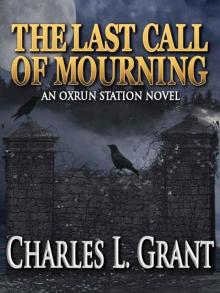 The Last Call of Mourning - An Oxrun Station Novel (Oxrun Station Novels)
The Last Call of Mourning - An Oxrun Station Novel (Oxrun Station Novels)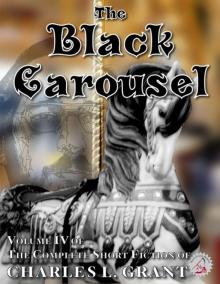 The Complete Short Fiction of Charles L. Grant, Volume IV: The Black Carousel
The Complete Short Fiction of Charles L. Grant, Volume IV: The Black Carousel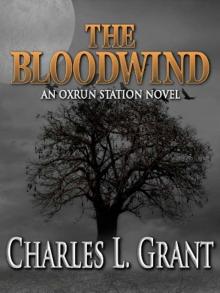 The Bloodwind - An Oxrun Station Novel (Oxrun Station Novels)
The Bloodwind - An Oxrun Station Novel (Oxrun Station Novels)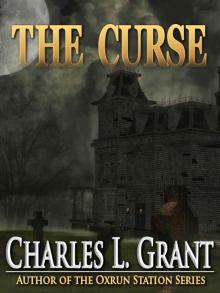 The Curse
The Curse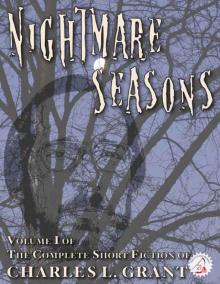 The Complete Short Fiction of Charles L. Grant Volume 1: Nightmare Seasons (Necon Classic Horror)
The Complete Short Fiction of Charles L. Grant Volume 1: Nightmare Seasons (Necon Classic Horror)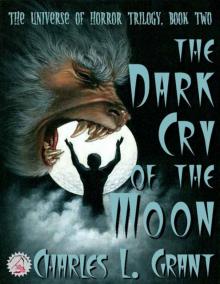 The Universe of Horror Volume 2: The Dark Cry of the Moon (Neccon Classic Horror)
The Universe of Horror Volume 2: The Dark Cry of the Moon (Neccon Classic Horror)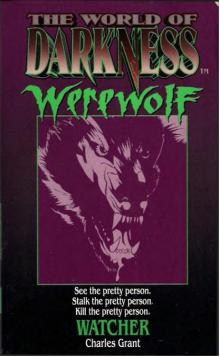 Watcher: Based on the Apocalypse (World of Darkness : Werewolf)
Watcher: Based on the Apocalypse (World of Darkness : Werewolf)![[Oxrun Station] The Bloodwind Read online](http://i1.bookreadfree.com/i/03/25/oxrun_station_the_bloodwind_preview.jpg) [Oxrun Station] The Bloodwind
[Oxrun Station] The Bloodwind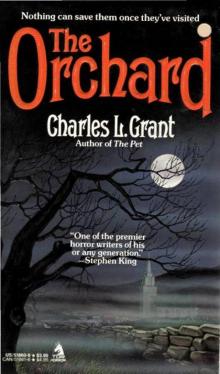 The Orchard
The Orchard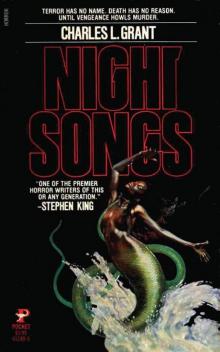 Night Songs
Night Songs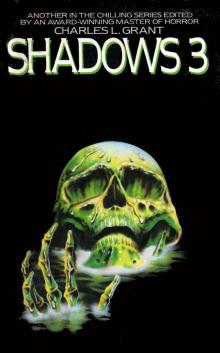 Shadows 3
Shadows 3![Symphony - [Millennium Quartet 01] Read online](http://i1.bookreadfree.com/i1/04/02/symphony_-_millennium_quartet_01_preview.jpg) Symphony - [Millennium Quartet 01]
Symphony - [Millennium Quartet 01] The Hour of the Oxrun Dead (Necon Classic Horror)
The Hour of the Oxrun Dead (Necon Classic Horror)![In the Mood - [Millennium Quartet 02] Read online](http://i1.bookreadfree.com/i1/03/31/in_the_mood_-_millennium_quartet_02_preview.jpg) In the Mood - [Millennium Quartet 02]
In the Mood - [Millennium Quartet 02]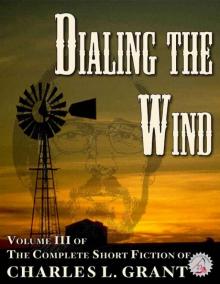 The Complete Short Fiction of Charles L. Grant Volume 3: Dialing the Wind (Neccon Classic Horror)
The Complete Short Fiction of Charles L. Grant Volume 3: Dialing the Wind (Neccon Classic Horror)![[Oxrun Station] The Last Call of Mourning Read online](http://i1.bookreadfree.com/i2/04/05/oxrun_station_the_last_call_of_mourning_preview.jpg) [Oxrun Station] The Last Call of Mourning
[Oxrun Station] The Last Call of Mourning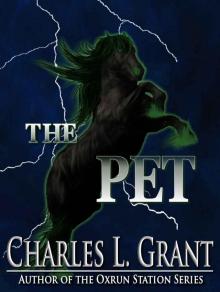 The Pet
The Pet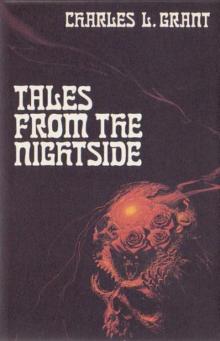 Tales from the Nightside
Tales from the Nightside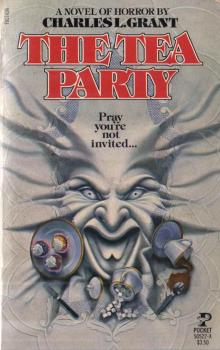 The Tea Party - A Novel of Horror
The Tea Party - A Novel of Horror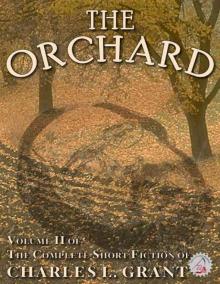 The Complete Short Fiction of Charles L. Grant Volume 2: The Orchard (Necon Classic Horror)
The Complete Short Fiction of Charles L. Grant Volume 2: The Orchard (Necon Classic Horror) Whirlwind
Whirlwind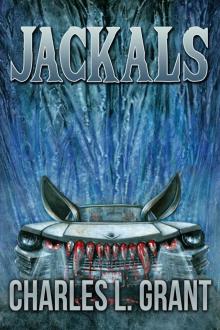 Jackals
Jackals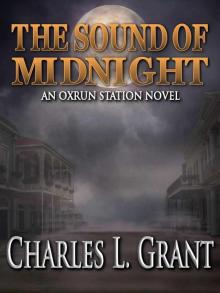 The Sound of Midnight - An Oxrun Station Novel
The Sound of Midnight - An Oxrun Station Novel